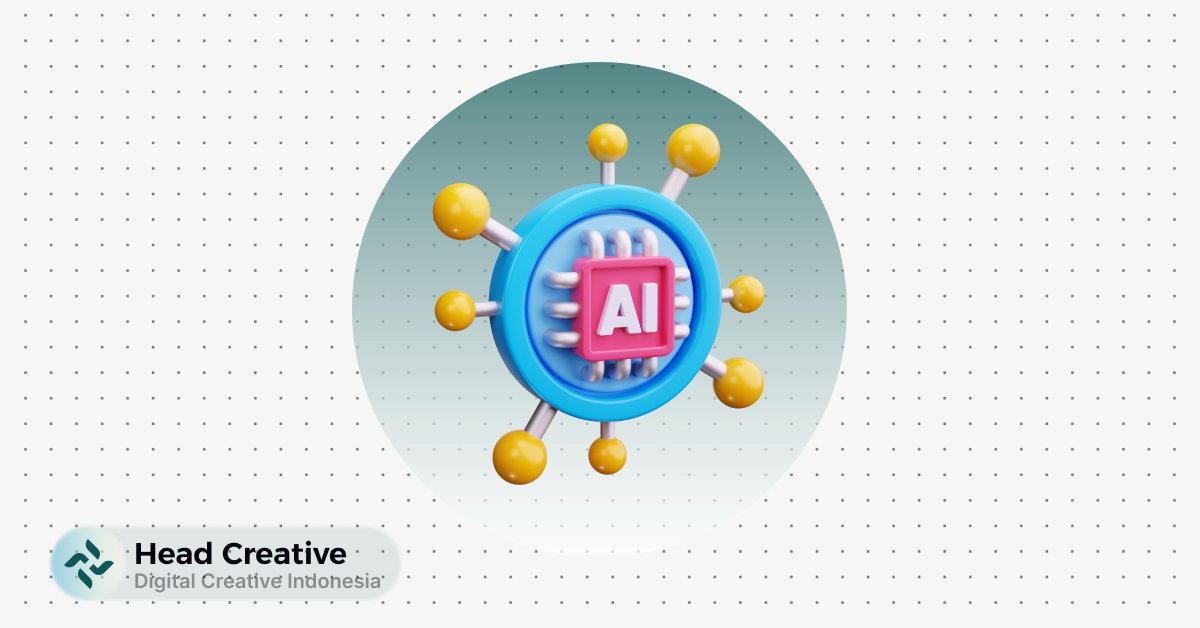Why Is AI Important in SEO Strategy?
In today’s increasingly competitive digital era, SEO is no longer just about inserting keywords into content. Now, Artificial Intelligence (AI) has become a key pillar in developing effective strategies to optimize website SEO. Why is AI so important? Here’s an in-depth explanation:
1. AI’s Ability to Analyze Large-Scale Data
One of AI’s main advantages is its capability to analyze vast amounts of data at incredible speed. In the context of SEO, data such as user behavior, keyword performance, and competitor analysis can be highly complex and challenging to process manually.
How Does AI Help?
- Search Trend Analysis: AI can map changes in search trends in real-time, helping you understand what audiences are looking for.
- SEO Performance Evaluation: With intelligent algorithms, AI can thoroughly evaluate content performance, web pages, and backlinks.
- User Behavior Prediction: AI not only analyzes data but can also predict future user behavior, making SEO strategies more proactive.
The Result?
You don’t just collect data—you gain valuable insights to design more targeted SEO strategies.
2. Time Efficiency and Accuracy in SEO Optimization
Managing SEO manually requires significant time and resources. This is where AI plays a vital role. With effective AI-driven strategies, the SEO optimization process becomes much more efficient and accurate.
Benefits of AI’s Efficiency and Accuracy in SEO:
- Automating Routine Tasks: AI can automate tasks like SEO audits, broken link checks, and meta tag generation.
- Precise Content Optimization: AI can analyze content to ensure optimal keyword usage, SEO-friendly structure, and topic relevance.
- High Data Accuracy: Compared to manual analysis, AI can process data with higher accuracy, minimizing the risk of human error.
With more efficient time management and accurate results, you can focus on more strategic aspects, such as creative content development and marketing strategies.
3. Personalizing User Experience with AI Data
SEO is not just about ranking on search engines; it’s also about optimizing the user experience. AI plays a crucial role in creating personalized and relevant user experiences.
How Does Personalization with AI Work?
- Content Recommendations: AI can analyze user preferences to suggest relevant content, increasing visit duration and engagement.
- UX (User Experience) Optimization: AI helps identify UX elements that need improvement, such as page speed, layout, and site navigation.
- Real-Time Behavior Analysis: By monitoring user behavior in real-time, AI enables dynamic content adjustments, making the user experience more personal and relevant.
Through this data-driven personalization, effective AI strategies not only enhance website visibility on search engines but also strengthen user loyalty.
How to Use AI for Website SEO Optimization
Adopting effective AI strategies for SEO optimization isn’t just about following trends; it’s about leveraging this technology to achieve better, more efficient results. Here are some key ways to use AI to optimize your website’s SEO:
1. Smart Keyword Research
Keyword research is the foundation of a successful SEO strategy. With AI, this process becomes smarter and more efficient.
How Does AI Help with Keyword Research?
- Search Trend Analysis: AI can process search data from various sources to identify emerging trends.
- Identifying Potential Keywords: Using advanced algorithms, AI can find high-search-volume keywords with low competition.
- Keyword Performance Prediction: AI can predict how a keyword will perform in the future based on historical search patterns.
With this approach, you can focus on highly relevant keywords with strong potential to drive traffic.
2. Content Creation & Optimization
AI doesn’t just help with keyword discovery—it also supports the content creation and optimization process.
Benefits of AI in Content Optimization:
- Content Idea Generation: AI can analyze trending topics and suggest relevant content ideas.
- Content Structure Analysis: AI ensures articles follow SEO best practices, including proper use of headings, paragraphs, and internal linking.
- Improvement Recommendations: AI can identify areas of content that need improvement to enhance readability and relevance.
With effective AI-driven strategies, the content creation process becomes more focused and efficient, producing articles that are not only SEO-friendly but also engaging for readers.
3. Website Performance Analysis
Monitoring SEO performance is crucial to ensure strategies are working effectively. AI plays a significant role in this area.
How Does AI Improve Website Performance Analysis?
- Real-Time Monitoring: AI can track website performance in real-time, identifying issues like traffic drops or slow site speeds.
- UX Analysis: AI helps analyze UX elements, such as user interactions, bounce rates, and time spent on pages.
- Automated Performance Reports: AI provides detailed, automated SEO performance reports, simplifying strategic decision-making.
Through in-depth analysis, you can quickly and accurately adjust your SEO strategy.
4. Effective Backlink Strategies
Backlinks remain one of the most important factors in SEO. With AI, you can develop more effective and efficient backlink strategies.
How Does AI Help with Backlink Strategies?
- Identifying High-Quality Backlink Opportunities: AI can analyze competitor backlink profiles to find relevant backlink opportunities.
- Backlink Quality Evaluation: AI helps assess backlink quality, avoiding links from risky sites that could harm your SEO.
- Automated Outreach: Some AI tools can automate outreach processes to build backlink networks more efficiently.
With this approach, effective AI strategies ensure the backlinks you build positively impact your website’s rankings.
Read Also: AI SEO Tools to Enhance Agile Solutions: The Future of SEO
Popular AI Tools for SEO and Their Functions
Integrating effective AI-driven strategies in SEO can be maximized by using the right tools. There are various popular AI tools specifically designed to support SEO optimization. Here are some of them:
1. Surfer SEO
Surfer SEO is a highly popular AI tool among SEO practitioners.
Main Functions of Surfer SEO:
- On-Page Optimization: Provides in-depth analysis on how to optimize content according to SEO standards.
- SERP Analysis: Helps analyze top-ranking pages on Google to understand their success factors.
- Keyword Recommendations: Offers relevant keyword suggestions to improve content visibility.
2. Clearscope
Clearscope is a tool designed to enhance content quality, making it more SEO-friendly.
Benefits of Clearscope:
- Content Optimization: Analyzes your content and provides recommendations to improve readability and relevance.
- Competitor Analysis: Compares your content with competitors to identify optimization gaps.
- Keyword Research: Suggests additional keywords to support your SEO strategy.
3. SEMrush AI
SEMrush is one of the most comprehensive SEO tools with advanced AI features.
Key Features of SEMrush AI:
- Automated SEO Audit: Analyzes your website to identify technical SEO issues.
- Competitor Research: Provides deep insights into competitors’ SEO strategies.
- Backlink Analysis: Easily manages and analyzes backlink profiles.
4. ChatGPT for Content Ideas
ChatGPT, like the one you’re using now, is also highly effective in assisting with SEO content creation and optimization.
How Does ChatGPT Help?
- Content Idea Generation: Provides creative ideas for article topics based on the latest trends.
- Text Optimization: Assists in structuring SEO-friendly articles.
- SEO Recommendations: Offers optimization tips based on SEO best practices.
Take Advantage of Our Services: SEO Services
Challenges and Tips for Using AI in SEO
While effective AI-driven strategies offer numerous benefits for SEO optimization, there are also challenges to be mindful of. Relying entirely on AI without proper understanding can lead to suboptimal results. Here are some common challenges and tips to overcome them.
1. The Risk of Over-Reliance on AI Without Manual Validation
Relying solely on AI in SEO strategies can backfire if not accompanied by manual validation.
Risks:
- Analytical Errors: AI may produce irrelevant recommendations without considering business context or target audience.
- Overly Generic Content: AI-generated content tends to be generic if there’s no human touch.
Tips to Overcome This:
- Always Conduct Manual Reviews: Even if AI provides recommendations, ensure you review and adjust them according to your business needs.
- Use AI as a Tool, Not a Replacement: Treat AI as an assistant to improve efficiency, not as a complete substitute for decision-making.
2. The Importance of Prioritizing Human Creativity
AI excels at data analysis, but creativity remains a distinctly human domain.
Why Is Creativity Important?
- Creating Relevant and Emotional Content: AI can write, but only humans can craft stories that emotionally connect with audiences.
- Adapting to Trends: AI relies on historical data, while humans can quickly adapt to emerging trends.
Tips:
- Combine AI Data with Human Insights: Use AI-generated data for insights, but let human creativity bring the content to life.
- Be Bold in Experimentation: Don’t be afraid to try new approaches that AI might not have identified yet.
3. Tips for Integrating AI with Traditional SEO Strategies
Combining AI with traditional SEO strategies can deliver more optimal results.
How to Do It?
- Leverage AI for Data Analysis and Technical SEO: Let AI handle technical aspects like SEO audits, keyword analysis, and performance monitoring.
- Traditional SEO for Long-Term Strategies: Focus traditional SEO efforts on building brand authority, enhancing user experience, and fostering strong relationships.
Integration Tips:
- Balance Is Key: Avoid over-reliance on either approach. A balanced combination of AI and traditional strategies yields the best results.
- Keep Learning and Adapting: SEO is ever-evolving. Stay updated with AI technology advancements and search engine algorithm changes.
Conclusion
Facing challenges in using AI for SEO is part of the journey toward more effective strategies. By understanding the risks of over-reliance, maintaining a focus on human creativity, and integrating AI with traditional SEO approaches, you can maximize the potential of effective AI-driven strategies.
Remember, AI is an incredible tool, but the key to success lies in the smart combination of technology and human touch.


